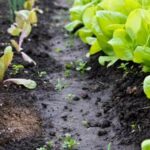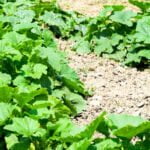Are you looking to take your vegetable garden to the next level? The secret might just lie in using hardwood mulch. In this blog post, we will explore the numerous benefits of incorporating hardwood mulch into your vegetable gardens. From improving soil health to enhancing plant performance, hardwood mulch offers a wealth of advantages that can help you achieve a thriving and productive garden.
One of the primary advantages of using hardwood mulch is its ability to improve soil quality. By acting as a natural barrier between the soil and external elements, such as extreme temperatures and heavy rainfall, hardwood mulch helps to regulate temperature and moisture levels in the soil. This creates optimal growing conditions for your vegetables while reducing water evaporation and minimizing weeds.
In addition, hardwood mulch promotes nutrient retention in the soil. As it decomposes over time, it releases valuable organic matter and essential nutrients that enrich the soil, providing a steady supply of nourishment to your plants. This not only leads to healthier plants but also improves their disease resistance and overall performance.
By using hardwood mulch in your vegetable gardens, you can create an environment that supports flourishing plant growth and maximizes your harvest. Stay tuned for the upcoming sections where we will dive deeper into understanding different types of hardwood mulch, proper application techniques, and how to combine it with organic fertilizers and compost for even better results.
Get ready to unlock the full potential of your vegetable garden by harnessing the power of hardwood mulch.
Understanding Hardwood Mulch
When it comes to using hardwood mulch in vegetable gardens, it is important to have a solid understanding of the different types, sources, and considerations involved. This section will provide you with the knowledge you need to make informed decisions about choosing and acquiring hardwood mulch for your garden.
Firstly, let’s discuss the types of hardwood mulch that are suitable for vegetable gardens. Common options include oak, maple, beech, and hickory mulch. These hardwood varieties are preferred over softwoods like pine or cedar, as they break down more slowly and provide long-term benefits to the soil.
Now that we know the types of hardwood mulch available, let’s explore where we can source it from. One option is to contact local tree trimming services or arborists who often offer free wood chips. This not only provides you with a sustainable source of mulch but also helps these service providers dispose of wood waste responsibly.
Alternatively, garden centers and nurseries also sell bagged or bulk hardwood mulch if you prefer a more convenient option. Additionally, if you have access to fallen branches or trees on your property, you can create your own hardwood mulch through DIY methods such as chipping or composting.
Considerations when using hardwood mulch include its age, moisture content, and composting stage. Freshly chipped wood can be high in nitrogen which may temporarily deplete soil nitrogen levels as it decomposes. Therefore, it is best if the wood chips have been aged for at least six months before applying them to your garden beds.
It is also essential to ensure that the moisture content of the mulch is appropriate – too dry and it won’t break down effectively; too wet and it may promote fungal growth or become compacted. Additionally, if using partially decomposed wood chips as composting material directly in your garden beds instead of mulch, be cautious of its carbon-to-nitrogen ratio to avoid nutrient imbalances.
Understanding the types, sources, and considerations of hardwood mulch will enable you to make informed choices that align with the needs of your vegetable garden. In the next section, we will delve into the proper application techniques to maximize the benefits of using hardwood mulch in your vegetable garden.
Proper Application Techniques
Layering the Mulch
One of the essential techniques for applying hardwood mulch in vegetable gardens is proper layering. Start by preparing the soil and removing any weeds or debris. Next, spread a layer of compost or organic fertilizer evenly across the garden bed. This layer acts as a nutrient-rich base for your plants.
Once the base layer is in place, apply a layer of hardwood mulch on top. Aim for a thickness of around 2-4 inches, making sure to leave some space around the plant stems to prevent rot and disease. Be careful not to over-mulch, as excessive mulch depth can disrupt water penetration and hinder root development.
Timing and Thickness
Timing is crucial when it comes to applying hardwood mulch. Ideally, you should wait until after seedlings have established themselves before applying mulch. This allows for better airflow and prevents seedlings from getting smothered by the mulch.
During hot summer months, it’s especially important to monitor your garden’s moisture levels. Apply a thicker layer (around 4 inches) of hardwood mulch during these periods to help retain moisture and regulate soil temperature. In cooler seasons, you can reduce the thickness to maintain optimal growing conditions.
Preventing Over-Mulching and Potential Issues with Root Development
While using hardwood mulch offers many benefits, it’s crucial to avoid over-mulching your vegetable garden. When too much mulch is applied, it can create an environment that is overly moist and lacks oxygen circulation. This can lead to root suffocation or fungal diseases.
To prevent potential issues with root development, regularly monitor the moisture levels beneath the mulch. If you notice excessive dampness or an unpleasant odor, it may be a sign of over-mulching or poor drainage. Gently pull back some layers of mulch around plants to allow for better airflow and drying if necessary.
By following these proper application techniques, you can ensure that your hardwood mulch provides optimal benefits to your vegetable garden. The layering process, timing, and thickness considerations will create an environment that promotes healthy plant growth, improved soil health, and efficient moisture management.
Benefits for Vegetable Gardens
Improving Soil Health
One of the key benefits of using hardwood mulch in vegetable gardens is its ability to improve soil health. When applied correctly, hardwood mulch can help create a healthy and fertile environment for plants to thrive. The organic matter in the mulch slowly breaks down over time, adding valuable nutrients to the soil. This enriches the soil’s composition and enhances its ability to retain moisture and essential minerals.
Furthermore, hardwood mulch acts as a barrier against erosion caused by wind or heavy rain. It helps prevent runoff by absorbing water and allowing it to gradually seep into the soil. This not only aids in maintaining optimal moisture levels for plant growth but also promotes water conservation.
Promoting Plant Performance
In addition to benefiting soil health, hardwood mulch also plays a significant role in promoting plant performance. By acting as an insulator, the mulch helps regulate soil temperature, protecting plants from extreme heat or cold. This is crucial for vegetable gardens as many crops are sensitive to temperature fluctuations.
Moreover, hardwood mulch serves as a natural weed suppressant. By creating a thick layer on top of the soil surface, it inhibits weed germination and growth by blocking sunlight from reaching weed seeds. This reduces competition for resources such as water and nutrients, allowing vegetable plants to grow more vigorously.
The use of hardwood mulch also helps minimize disease transmission within a vegetable garden. It acts as a barrier between the soil and plant foliage, reducing splashing that could spread pathogens. Furthermore, the beneficial microorganisms found in well-aged hardwood mulch can contribute to an overall healthier growing environment for vegetables.
By improving soil health and promoting plant performance, using hardwood mulch in vegetable gardens offers numerous benefits that contribute to successful cultivation.
Mulch Selection and Vegetable Compatibility
When it comes to choosing the right mulch for your vegetable garden, hardwood mulch can be a great option. However, it is important to consider the compatibility of different vegetables with hardwood mulch. Certain vegetables thrive when grown with hardwood mulch due to their moisture and temperature requirements, while others may have special considerations or exceptions.
One benefit of using hardwood mulch in vegetable gardens is its ability to regulate soil temperature. Some vegetables, such as tomatoes and peppers, prefer warmer soil temperatures for optimal growth. These heat-loving crops can greatly benefit from hardwood mulch as it helps retain heat and keep the soil warm, especially during cooler seasons.
Another advantage of using hardwood mulch is its moisture retention properties. Vegetables like cucumbers, melons, and squash require consistent soil moisture to prevent fruit cracking or drying out. Hardwood mulch acts as a natural barrier that helps reduce evaporation and maintain soil moisture levels. It also minimizes water runoff during heavy rainfall, ensuring that the plants receive adequate water without getting waterlogged.
| Vegetable | Compatibility with Hardwood Mulch |
|---|---|
| Tomatoes | Compatible – Benefits from heat retention |
| Peppers | Compatible – Benefits from heat retention |
| Cucumbers | Compatible – Benefits from moisture retention |
| Melons | Compatible – Benefits from moisture retention |
| Squash (summer and winter) | Compatible – Benefits from moisture retention |
| Leafy Greens (lettuce, spinach, kale) | Compatible |
| Root Vegetables (carrots, radishes) | Compatible with caution – Ensure adequate soil drainage to prevent rotting |
Mulch Maintenance and Troubleshooting
Maintaining hardwood mulch in vegetable gardens is crucial to ensure optimal performance and prevent potential issues from arising. This section will address common maintenance issues that may occur when using hardwood mulch and provide practical tips and solutions to troubleshoot and mitigate these problems effectively.
1. Mold: One common issue with hardwood mulch is the development of mold, especially when the mulch layer becomes too thick or is excessively moist. To prevent mold growth, monitor the moisture levels regularly and avoid over-mulching. Additionally, ensure proper air circulation by occasionally fluffing the mulch or gently turning it over.
2. Rot: Excessive moisture can also lead to rotting, particularly in areas where water tends to accumulate or if the mulch is piled too close to plant stems. It’s important to maintain a proper distance between the base of plants and the mulch layer. Regularly inspect plants for signs of rot, such as wilting leaves or discolored stems, and promptly remove any affected plant material.
3. Pests: While hardwood mulch does not attract pests as readily as other types of mulches, some insects might still be drawn to it. To deter pests from causing damage, consider incorporating insect-repelling plants into your garden bed or use natural pest control methods such as companion planting or introducing beneficial insects like ladybugs or praying mantises.
4. Nutrient Imbalances: Over time, hardwood mulch can deplete nitrogen from the soil due to its natural decomposition process. This may result in nutrient imbalances that can hinder plant growth and development. To counteract this, regularly monitor nitrogen levels through soil testing and incorporate organic fertilizers high in nitrogen when necessary.
By addressing these common maintenance issues promptly, you can keep your vegetable garden thriving and maximize the benefits of hardwood mulch. Remember to closely monitor the condition of your plants, regularly inspect the mulch layer, and make necessary adjustments as needed. With proper maintenance, you can enjoy a healthy and productive vegetable garden for years to come.
Best Practices for Combining Hardwood Mulch with Organic Fertilizers and Compost
Properly integrating hardwood mulch with organic fertilizers and compost is crucial for maintaining a balanced nutrient profile in your vegetable garden beds. By following best practices, you can maximize the benefits of both mulch and organic amendments, ensuring optimal plant growth and health. Here are some guidelines to help you achieve a successful combination:
- Choose high-quality organic fertilizers: When selecting organic fertilizers to use alongside hardwood mulch, opt for those that are well-aged, properly composted, and have a balanced nutrient content. This will ensure that your plants receive the necessary nutrients without any potential damage or burn.
- Apply fertilizers before mulching: It is recommended to apply organic fertilizers before applying hardwood mulch. This allows the nutrients from the fertilizer to penetrate the soil more effectively, reaching the roots of the plants.
- Maintain proper timing: Consider timing when it comes to applying fertilizers and compost in relation to hardwood mulch. Apply fertilizers at least a week before adding mulch so that it has ample time to settle into the soil. Compost can be added either before or after applying hardwood mulch, but it is advisable to avoid placing it directly on top of young plants.
It’s important to note that excessive amounts of organic matter from both hardwood mulch and organic amendments can lead to nutrient imbalances or root suffocation. Therefore, keep these tips in mind:
- Avoid over-fertilization: Applying too much fertilizer can result in nutrient imbalances or even harm plant roots. Follow package instructions for recommended application rates or consult with a garden expert if needed.
- Prevent over-mulching: While hardwood mulch is beneficial for moisture retention and weed suppression, too much mulch can suffocate plant roots by trapping excessive moisture and reducing oxygen availability. Apply mulch in a layer no thicker than 2 to 3 inches.
- Monitor nutrient needs: Regularly test your soil’s nutrient levels to ensure that your plants are receiving the appropriate amounts of nutrients. Adjust fertilizer application accordingly to maintain a healthy balance.
By following these best practices, you can effectively combine hardwood mulch with organic fertilizers and compost, creating an optimal nutrient-rich environment for your vegetable garden. Remember to always consider the specific needs of your plants and make adjustments as necessary.
Long-Term Benefits and Sustainability
Using hardwood mulch in your vegetable garden does not only provide short-term benefits but also offers long-term rewards for your soil and overall garden health. By incorporating hardwood mulch into your gardening practices, you can create a sustainable system that improves over time.
One of the main long-term benefits of using hardwood mulch is the improvement of soil quality and fertility. As wood chips break down, they release organic matter and nutrients into the soil, enriching it with essential elements for plant growth. This process enhances soil structure, increases water retention capacity, and promotes beneficial microbial activity. Over time, your garden beds will become more fertile, resulting in healthier plants and increased yields.
Additionally, using hardwood mulch in your vegetable garden contributes to environmental sustainability and waste reduction. Instead of disposing of wood waste in landfills or burning it, utilizing hardwood mulch allows you to put this natural resource to good use. By repurposing tree trimmings or lumber scraps as mulch, you are participating in a sustainable practice that reduces waste and lessens your carbon footprint.
To maximize the long-term benefits of using hardwood mulch in your vegetable garden, it’s important to regularly maintain the mulch layer. As the mulch decomposes, replenish it annually by adding fresh wood chips on top. This continuous cycle of adding new layers while allowing the old ones to break down will help preserve soil moisture levels, regulate temperature fluctuations, suppress weeds, and continue enriching the soil over time.
By embracing hardwood mulch as a valuable resource in your vegetable garden, you are setting yourself up for long-term success. Not only will you experience immediate benefits such as improved plant growth and reduced weed competition but you will also enjoy a sustainable gardening system that enhances soil health and reduces waste accumulation. So go ahead, start incorporating hardwood mulch into your gardening routine and reap the rewards for many seasons to come.
Conclusion
In conclusion, using hardwood mulch in your vegetable garden can bring a multitude of benefits and enhance the overall health and performance of your plants. By improving soil health, retaining moisture, regulating temperature, and suppressing weed growth, hardwood mulch creates an optimal environment for your vegetables to thrive. Additionally, the positive impact on plant growth, yield, and disease prevention cannot be overlooked.
As you embark on your journey with hardwood mulch in your vegetable garden, remember to select the right type of mulch that suits your specific needs. Consider factors such as moisture content and composting stage to ensure you are maximizing its benefits. Proper application techniques are also crucial for achieving optimal results. Layering the mulch and timing its application correctly will help prevent issues such as over-mulching or hindered root development.
It is important to note the long-term benefits and sustainability that come with using hardwood mulch. Continuously incorporating it into your gardening routine can lead to improved soil quality and fertility over time. Moreover, by utilizing this natural resource, you are contributing to waste reduction and promoting environmental sustainability.
So why wait? Embrace the power of hardwood mulch in your vegetable garden today. Start experimenting with it and witness the transformative effects it can have on your plants. We encourage you to share your experiences or ask any questions in the comments section below. Happy gardening.
Frequently Asked Questions
Is it OK to use hardwood mulch in vegetable garden?
Using hardwood mulch in a vegetable garden can be acceptable, depending on several factors. Hardwood mulch can help retain soil moisture, suppress weed growth, and regulate soil temperature, which are all beneficial for vegetable plants. However, it is crucial to consider the source of the mulch to ensure it does not contain any harmful chemicals or contaminants that could affect the quality and safety of the vegetables.
Additionally, hardwood mulch may break down slowly, potentially depleting nitrogen as it decomposes. It is important to monitor soil nutrient levels and regularly replenish with organic matter to maintain a fertile growing environment.
Is hardwood mulch good for raised garden beds?
Hardwood mulch can be an excellent choice for raised garden beds due to its numerous advantages. Similar to its use in regular gardens, hardwood mulch helps to conserve moisture by reducing evaporation and acts as a protective layer against weeds by obstructing their growth.
Raised garden beds tend to dry out faster than ground-level beds since they are exposed to more air circulation, making the moisture-retention properties of hardwood mulch particularly valuable. Additionally, hardwood mulch provides insulation for the root systems of plants in raised beds during extreme weather conditions, preserving them from cold temperatures in winter and excessive heat in summer.
Is hardwood mulch good for gardens?
Hardwood mulch can have several positive impacts on gardens when used correctly. As mentioned before, it aids in moisture retention by reducing water loss through evaporation from the soil surface. This is especially helpful during hot and dry periods when regular watering alone might not be sufficient for plant survival.
Furthermore, hardwood mulch helps prevent weed growth by blocking sunlight from reaching weed seeds below the surface of the soil. By acting as a protective barrier against weeds that compete for nutrients and water with desired plants, it contributes to overall garden health and reduces maintenance efforts. Lastly, as hardwood mulch breaks down over time, it adds organic matter to the soil, enhancing its fertility and promoting healthy microbial activity necessary for plant growth.

If you’re looking to get into vegetable gardening, or are just looking for some tips on how to make your current garden better, then you’ve come to the right place! My name is Ethel and I have been gardening for years. In this blog, I’m going to share with you some of my best tips on how to create a successful vegetable garden.





